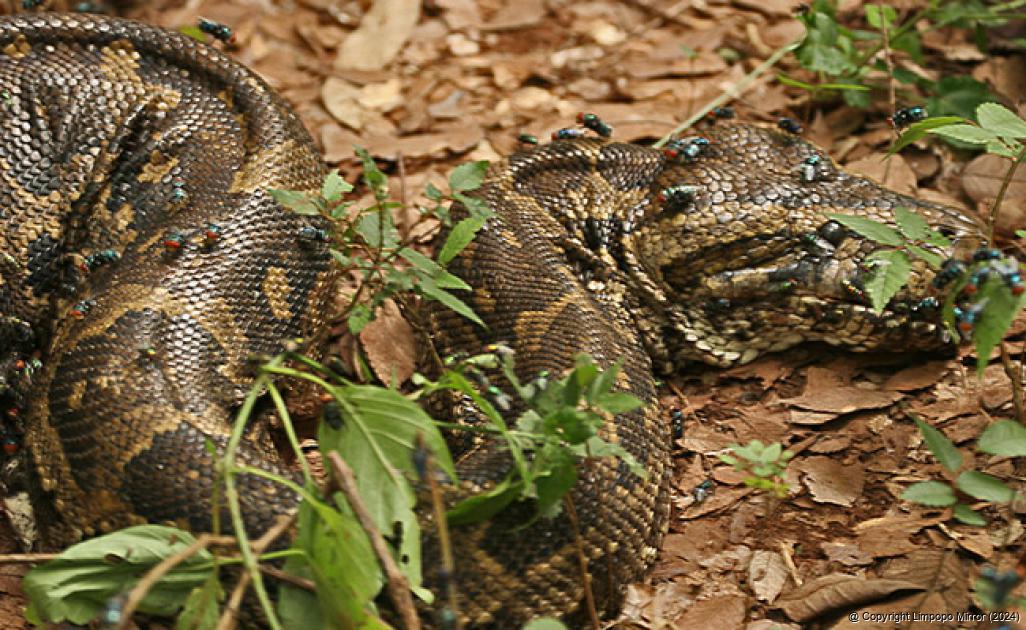

ADVERTISEMENT:

An African rock python photographed in the Komatiland Hanglip Forestry in 2013.
“Please do not kill endangered species”
Several wildlife protection groups have called upon residents not to kill endangered species such as pythons and to rather notify authorities in order for problem animals to be relocated.
The Wildlife and Environment Society of South Africa (WESSA) and the Wildlife Protection Unit of the National Society for the Prevention of Cruelty to Animals (NSPCA) condemned the killing of endangered species. The NSPCA also urged people to stop perceiving these animals as threats.
Recently, a rock python was killed in Tshisele village outside Thohoyandou. The residents regarded the snake as a threat and also the cause for the disappearance of livestock such as chickens.
Nature conservation non-governmental organizations, however, called on people to refrain from such deeds. According to the NSPCA, pythons are a protected species under the National Environment Management: Biodiversity Act and killing them is therefore illegal.
The National Senior Inspector at the Wildlife Protection Unit of NSPCA, Isabel Wentzel, says many animal species, such as rock pythons, live alongside communities and have been doing this for decades, without the communities' knowing about their existence.
“It is only once the community members actually see the animals that they end up believing that man and animal cannot co-exist and want the animals removed or killed,” says Wentzel.
WESSA supports this notion and urges the public to understand the role of snakes as it is similar to that of owls. “An important role that snakes and owls, for example, play in our society is that they keep the rodent population (rats) controlled and therefore protect us from diseases we may catch from rats in our homes,” says Catherine Ritchie from WESSA.
According to WESSA, all species on the planet, including humans, have a purpose in maintaining the balance in nature.
The NSPCA said that snakes are commonly regarded by superstitious people as ‘evil’ and these people believe they must be killed. Snakes are also collected by traditional healers and often misused to extort money from their clients by playing upon their beliefs.
Wentzel adds that, in most cases, the animals will do no harm unless confronted and cornered by humans. “People need to learn to see the benefit in having these animals around their communities rather than removing them. In many cases when an animal is removed, another will take its place very quickly and it can actually encourage an increase of the same species in order to fill the void of the removed specimen,” she says.
Both organizations appealed to members of the public to consider contacting Nature Conservation's offices when they encounter problem animals.
“Most of Nature Conservation's offices have contact details for ‘snake catchers’ who catch and remove snakes from conflict situations and relocate them elsewhere. The SPCAs can also sometimes fulfil this duty,” she says.
Date:14 November 2014
By: Phathutshedzo Luvhengo
Read: 1962

ADVERTISEMENT

ADVERTISEMENT:

ADVERTISEMENT:

Recent Articles
-

Stiff penalties get issued to undisciplined SAFA Vhembe teams
18 April 2024 By Kaizer Nengovhela -

Battle of the Stars awaits in Sasol Women’s League
18 April 2024 By Frank Mavhungu -

Community threatens with shutdown if roads are not fixed
18 April 2024 By Elmon Tshikhudo -

Young Ravhuhali steers the ship successfully at Vhembe FM
18 April 2024 By Elmon Tshikhudo -

A new traditional leader gets installed at Phiphidi
18 April 2024 By Kaizer Nengovhela

ADVERTISEMENT

Popular Articles
-

Leopards’ top striker dreams of playing for Kaizer Chiefs
22 March 2024 By Frank Mavhungu -

Well-known inventor, Prof Mulalo Doyoyo, dies
14 March 2024 By Victor Mukwevho -

Lesley Manyathela stadium remains a 'white elephant' to local clubs
23 March 2024 By Kaizer Nengovhela -

Murder suspect appears in Mutale Court
22 February 2024 By Victor Mukwevho -

Masindi case likely to introduce new era of customary law
24 February 2024 By Anton van Zyl -

Park development leaves residents puzzled
22 March 2024 By Andries van Zyl -

Many questions as man shoot himself in the head
15 March 2024 By Elmon Tshikhudo

